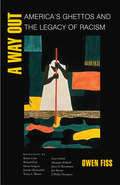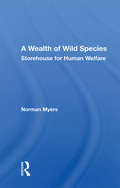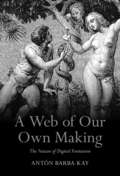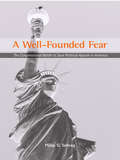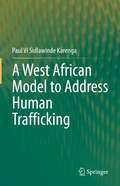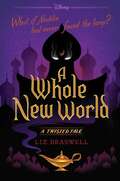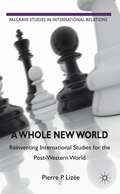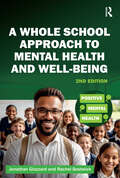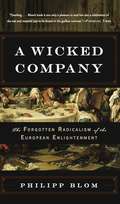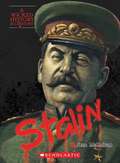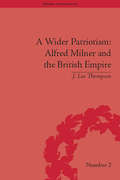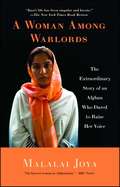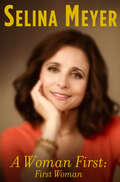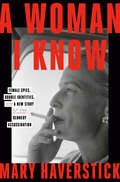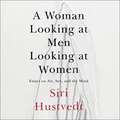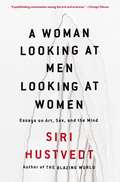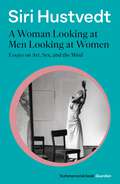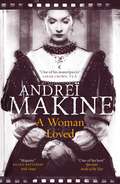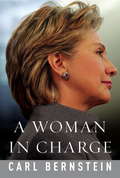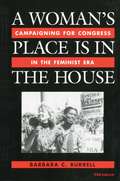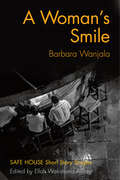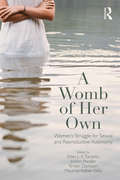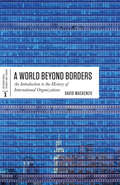- Table View
- List View
A Way Out: America's Ghettos and the Legacy of Racism
by Owen FissAfter decades of hand-wringing and well-intentioned efforts to improve inner cities, ghettos remain places of degrading poverty with few jobs, much crime, failing schools, and dilapidated housing. Stepping around fruitless arguments over whether or not ghettos are dysfunctional communities that exacerbate poverty, and beyond modest proposals to ameliorate their problems, one of America's leading experts on civil rights gives us a stunning but commonsensical solution: give residents the means to leave. Inner cities, writes Owen Fiss, are structures of subordination. The only way to end the poverty they transmit across generations is to help people move out of them--and into neighborhoods with higher employment rates and decent schools. Based on programs tried successfully in Chicago and elsewhere, Fiss's proposal is for a provocative national policy initiative that would give inner-city residents rent vouchers so they can move to better neighborhoods. This would end at last the informal segregation, by race and income, of our metropolitan regions. Given the government's role in creating and maintaining segregation, Fiss argues, justice demands no less than such sweeping federal action. To sample the heated controversy that Fiss's ideas will ignite, the book includes ten responses from scholars, journalists, and practicing lawyers. Some endorse Fiss's proposal in general terms but take issue with particulars. Others concur with his diagnosis of the problem but argue that his policy response is wrongheaded. Still others accuse Fiss of underestimating the internal strength of inner-city communities as well as the hostility of white suburbs. Fiss's bold views should set off a debate that will help shape urban social policy into the foreseeable future. It is indispensable reading for anyone interested in social justice, domestic policy, or the fate of our cities.
A Wealth Of Wild Species: Storehouse For Human Welfare
by Norman MyersThis book tells how our welfare is ever more intimately tied up with the welfare of the millions of species that share the One Earth home with us. It presents a synoptic review of the contributions that wild species make, and can make, to our daily lives.
A Web of Our Own Making: The Nature of Digital Formation
by Antón Barba-KayThere no longer seems any point to criticizing the internet. We indulge in the latest doom-mongering about the evils of social media-on social media. We scroll through routine complaints about the deterioration of our attention spans. We resign ourselves to hating the internet even as we spend much of our waking lives with it. Yet our unthinking surrender to its effects-to the ways it recasts our aims and desires-is itself digital technology's most powerful achievement. A Web of Our Own Making examines how online practices are reshaping our lives outside our notice. Barba-Kay argues that digital technology is a 'natural technology'-a technology so intuitive as to conceal the extent to which it transforms our attention. He shows how and why this technology is reconfiguring knowledge, culture, politics, aesthetics, and theology. The digital revolution is primarily taking place not in Silicon Valley but within each of us.
A Wedding She'll Never Forget
by Robyn GradyRemembrance of Things PassionateShe's been making the "right" decisions all her life. But after elite D.C. event planner Scarlet Anders meets self-made billionaire Daniel McNeal-a rowdy, sexy male who laughs in the face of society-she wishes she could make different choices.Then she trips over a tangled wedding veil and everything changes. Because the resulting memory loss turns prim-and-proper Scarlet into carefree Scarlet. She jumps at Daniel's offer of a wild affair. Yet when her memory returns, she realizes she's in love with this man-but is he willing to give her a wedding of her own?
A Well-Founded Fear: The Congressional Battle to Save Political Asylum in America
by Philip G. SchragFirst published in 2000. Routledge is an imprint of Taylor & Francis, an informa company.
A West African Model to Address Human Trafficking
by Paul V.I. KarengaThis book describes the nature of trafficking in persons in West Africa, focusing on labor and sexual exploitation in the region, and recommends tailor-made solutions established by the Catholic Church in light of governmental authorities’ failure to effectively combat this scourge of humanity. While states’ efforts to fulfill their international obligations in developing anti-trafficking legislations are recognized, their failure to carry out prosecutions of offenders and ensure protection of the victims reveals that law alone is not a sufficient instrument for realizing human rights and improving people’s lives. Faced with the sobering background of less than successful efforts by governmental entities to end the trade in humans, this research study recommends adopting essential elements of Catholic social teaching, which rests on the inherent dignity of human beings allowing the development of political, socio-cultural, and religious reforms that will increase the effectiveness of existing legislation designed to combat trafficking. This faith-based approach highlights the role that religion may play in fulfilling the discretionary provisions of the Palermo Protocol by promoting the welfare and protecting the life and dignity of the victims. Additionally, religion is composed of sound moral ethics that determine people's behavior to refrain from the sinful conduct of trafficking. It also creates a sense of ethical responsibility that promotes supply chain transparency and ethical purchasing as well as advocating social reforms and anti-trafficking legislations initiatives. In fact, the author's approach, may be a model for other regions in the world and will be of interest to scholars, law and policy makers, human rights advocates and law enforcement agents working in the field of trafficking in persons.
A Whole New World (A Twisted Tale #Book One)
by Liz BraswellThe 1st installment in the New York Times best-selling A TWISTED TALE series asks: What if Aladdin had never found the lamp? <p><p>When Jafar steals the Genie’s lamp, he uses his first two wishes to become sultan and the most powerful sorcerer in the world. Agrabah lives in fear, waiting for his third and final wish.To stop the power-mad ruler, Aladdin and the deposed princess Jasmine must unite the people of Agrabah in rebellion. But soon their fight for freedom threatens to tear the kingdom apart in a costly civil war. p><p>What happens next? A Street Rat becomes a leader. A princess becomes a revolutionary. And readers will never look at the story of Aladdin in the same way again.
A Whole New World: Reinventing International Studies for the Post-Western World (Palgrave Studies in International Relations Series)
by Pierre P. LizéeThe consequences of the rise of emerging powers like China and India is becoming the most important topic of debate in international studies. This book focuses on the impact of these changes on the way we study international politics: if international politics is changing, should we also change international studies?
A Whole School Approach to Mental Health and Well-being (Positive Mental Health)
by Jonathan Glazzard Rachel BostwickIs mental health provision a concern in your school?Are you looking to develop a whole school approach to mental health issues?Do you need targeted, evidence-informed strategies?Suitable for both primary and secondary age phases, this book is exactly what you need by giving you targeted strategies for developing a whole school approach to mental health provision. The importance of creating a whole school culture which promotes a positive attitude towards mental health is emphasised throughout.Now completely revised to be relevant for a post-pandemic world, it provides: concise and practical guidance, practical case studies, thought-provoking questions to encourage reader reflection, and supportive techniques taken from teaching practice. The case studies reflect practice from schools that have completed the mental health award, including scenarios involving Senior Mental Health leads in schools, and there is new content related to: the impact of Covid-19, developing a mental health curriculum, partnership working, vulnerable groups and individuals, mental health interventions, supporting staff well-being, and age-phase-specific considerations.
A Wicked Company
by Philipp BlomThe flourishing of radical philosophy in Baron Thierry Holbach’s Paris salon from the 1750s to the 1770s stands as a seminal event in Western history. Holbach’s house was an international epicenter of revolutionary ideas and intellectual daring, bringing together such original minds as Denis Diderot, Laurence Sterne, David Hume, Adam Smith, Ferdinando Galiani, Horace Walpole, Benjamin Franklin, Guillaume Raynal, and Jean-Jacques Rousseau. In A Wicked Company, acclaimed historian Philipp Blom retraces the fortunes of this exceptional group of friends. All brilliant minds, full of wit, courage, and insight, their thinking created a different and radical French Enlightenment based on atheism, passion, reason, and truly humanist thinking. A startlingly relevant work of narrative history, A Wicked Company forces us to confront with new eyes the foundational debates about modern society and its future.
A Wicked History 20th Century: Joseph Stalin
by Sean MccollumIt's hard to imagine any fictional villain half as fiendish as the real-life warlords, tyrants, and pirates in these new Wicked biographies. Bet you can't read just one! He ruled with an iron fist, using his ruthless secret police to exterminate enemies of the state for more than three decades. By the time he died, some 700,000 people-mostly ordinary citizens-had been executed or sent to work camps. Meet Generalissimo Joseph Stalin, the most reviled communist leader of them all.
A Wider Patriotism: Alfred Milner and the British Empire (Empires in Perspective #2)
by J Lee ThompsonWhen Alfred Milner was knighted, he took as his motto Communis Patria, 'patriotism for our common country'. This is the study of Milner, which takes his politics, or 'constructive' imperialism as its primary theme. It also discovers a group of young female supporters of his vision.
A Woman Among Warlords: The Extraordinary Story of an Afghan Who Dared to Raise Her Voice
by Malalai JoyaMalalai Joya has been called "the bravest woman in Afghanistan." At a constitutional assembly in Kabul in 2003, she stood up and denounced her country's powerful NATO-backed warlords. She was twenty-five years old. Two years later, she became the youngest person elected to Afghanistan's new Parliament. In 2007, she was suspended from Parliament for her persistent criticism of the warlords and drug barons and their cronies. She has survived four assassination attempts to date, is accompanied at all times by armed guards, and sleeps only in safe houses. Often compared to democratic leaders such as Burma's Aung San Suu Kyi, this extraordinary young woman was raised in the refugee camps of Iran and Pakistan. Inspired in part by her father's activism, Malalai became a teacher in secret girls' schools, holding classes in a series of basements. She hid her books under her burqa so the Taliban couldn't find them. She also helped establish a free medical clinic and orphanage in her impoverished home province of Farah. The endless wars of Afghanistan have created a generation of children without parents. Like so many others who have lost people they care about, Malalai lost one of her orphans when the girl's family members sold her into marriage. While many have talked about the serious plight of women in Afghanistan, Malalai Joya takes us inside the country and shows us the desperate dayto-day situations these remarkable people face at every turn. She recounts some of the many acts of rebellion that are helping to change the country -- the women who bravely take to the streets in peaceful protest against their oppression; the men who step forward and claim "I am her mahram," so the fundamentalists won't punish a woman for walking alone; and the families that give their basements as classrooms for female students. A controversial political figure in one of the most dangerous places on earth, Malalai Joya is a hero for our times, a young woman who refused to be silent, a young woman committed to making a difference in the world, no matter the cost.
A Woman First: A Memoir
by Selina MeyerA hilarious parody memoir for the beloved Veep character portrayed for seven seasons by Emmy-winner Julia Louis-Dreyfus.Born and raised deep in the American heartland of God-fearing suburban Maryland, young Selina Eaton learned to love her country and her fellow man from her parents, Catherine, a sportswoman, dog lover, and philanthropist, and Gordon, or “Daddy” as she always called him, a businessman and entrepreneur. From an early age, Selina, an active, curious, happy-go-lucky child, showed an uncanny ability to relate to others and to solve their real-world problems with real-world solutions. In this she was inspired by her idol: feminist, humanitarian, stateswoman, and first lady, Eleanor Roosevelt.Eleanor Roosevelt maintained a lively relationship with many prominent figures of her time, including Adlai Stevenson, John F. Kennedy, Albert Schweitzer, and probably Pablo Casals. She inspired countless women to break out of the established roles for women in society, among them the pioneering aviatrix Amelia Earhart, with whom she flew several times.Dubbed the “Queen of the Air,” Amelia Earhart captivated the nation both with her bravery, skill, and daring when flying her planes and when challenging society’s hidebound attitudes as to what constituted a proper place for women. America mourned when she disappeared mysteriously somewhere in the Pacific during an attempted around-the-world flight in 1937. Speculation continues to this day as to Amelia’s ultimate fate, even as hope has faded that she may yet be found alive.With wit, wisdom, eloquence, and fearless honesty, Selina Meyer reveals for the first time what really goes on in the halls of power, including the ultimate hall, the White House. It’s all here: the triumphs, the tragedies, the personalities, and the momentous events that have shaped our times, brought together in a page-turning tale told as only Selina Meyer could tell it. Selina Meyer’s compassion, her sense of humor, her grace, and her uncommon willingness to bare her heart make this story revelatory, beautifully rendered, and unlike any other president’s memoir ever written. First Woman: A Woman First would be a fitting title for a book about Selina Meyer, Eleanor Roosevelt, or Amelia Earhart, but in this case, it is about Selina Meyer.
A Woman I Know: Female Spies, Double Identities, and a New Story of the Kennedy Assassination
by Mary HaverstickThe &“fascinating&” (The New York Times) true story of a filmmaker whose investigation of her film&’s subject opened a new window onto the world of Cold War espionage, CIA secrets, and the assassination of John F. Kennedy. &“A compelling real-life thriller.&”—The Telegraph (UK) Independent filmmaker Mary Haverstick thought she&’d stumbled onto the project of a lifetime—a biopic of aviation pioneer Jerrie Cobb, the key figure in a group of extraordinary women who in 1960 passed the same tests as the legendary male astronauts of the Mercury 7 but never went to space. Just as casting was set to begin, Haverstick received a mysterious warning from a government agent; soon she began to suspect that there was more to Jerrie&’s story than what met the eye. As she dug deeper, she discovered that Jerrie&’s life shadowed that of a mysterious CIA agent named June Cobb, whose espionage career traced an arc of intrigue from the jungles of South America to Fidel Castro&’s Cuba, to the communist literary circles in Mexico City—and ultimately into the dark heart of the Kennedy assassination in Dallas.Haverstick&’s attempt to learn the truth directly from Jerrie would plunge her into a cat-and-mouse game that stretched across a decade, deep into a thicket of coded CIA files. As she uncovered a remarkable set of mostly unknown women whose high-stakes intelligence work left its only traces in redacted files, she also found shocking new clues about what really happened at Dealey Plaza in 1963. Offering fresh insight into the Kennedy assassination and a vivid picture of women in midcentury intelligence, A Woman I Know brings to life the astonishing duplicities of the Cold War intelligence game, a world where code names and hidden identities were the lifeblood of spies bent on seeking advantage by any means necessary.
A Woman Looking at Men Looking at Women: Essays on Art, Sex, and the Mind
by Siri HustvedtA trail-blazing and inspiring collection of essays on art, feminism, neuroscience and psychology featuring The Delusions of Certainty, winner of the European Essay Prize 2019.As well as being a prize-winning, bestselling novelist, Siri Hustvedt is widely regarded as a leading thinker in the fields of neurology, feminism, art criticism and philosophy. She believes passionately that art and science are too often kept separate and that conversations across disciplines are vital to increasing our knowledge of the human mind and body, how they connect and how we think, feel and see. The essays in this volume - all written between 2011 and 2015 - are in three parts. A Woman Looking at Men Looking at Women brings together penetrating pieces on particular artists and writers such as Picasso, Kiefer and Susan Sontag as well as essays investigating the biases that affect how we judge art, literature, and the world in general. The Delusions of Certainty is an essay about the mind/body problem, showing how this age-old philosophical puzzle has shaped contemporary debates on many subjects and how every discipline is coloured by what lies beyond argument-desire, belief, and the imagination. The essays in the final section, What Are We? Lectures on the Human Condition, tackle such elusive neurological disorders as synesthesia and hysteria. Drawing on research in sociology, neurobiology, history, genetics, statistics, psychology and psychiatry, this section also contains a profound consideration of suicide and a towering reconsideration of Kierkegaard. Together they form an extremely stimulating, thoughtful, wide-ranging exploration of some of the fundamental questions about human beings and the human condition, delivered with Siri Hustvedt's customary lucidity, vivacity and infectiously questioning intelligence.
A Woman Looking at Men Looking at Women: Essays on Art, Sex, and the Mind
by Siri HustvedtA compelling and radical collection of essays on art, feminism, neuroscience, psychology, and philosophy from prize-winning novelist Siri Hustvedt, the acclaimed author of The Blazing World and What I Loved.Siri Hustvedt has always been fascinated by biology and how human perception works. She is a lover of art, the humanities, and the sciences. She is a novelist and a feminist. Her lively, lucid essays in A Woman Looking at Men Looking at Women begin to make some sense of those plural perspectives. Divided into three parts, the first section, "A Woman Looking at Men Looking at Women," investigates the perceptual and gender biases that affect how we judge art, literature, and the world in general. Among the legendary figures considered are Picasso, De Kooning, Jeff Koons, Louise Bourgeois, Anselm Kiefer, Susan Sontag, Robert Mapplethorpe, the Guerrilla Girls, and Karl Ove Knausgaard. The second part, "The Delusions of Certainty," is about the age-old mind/body problem that has haunted Western philosophy since the Greeks. Hustvedt explains the relationship between the mental and the physical realms, showing what lies beyond the argument--desire, belief, and the imagination. The final section, "What Are We? Lectures on the Human Condition," discusses neurological disorders and the mysteries of hysteria. Drawing on research in sociology, neurobiology, history, genetics, statistics, psychology, and psychiatry, this section also contains a profound and powerful consideration of suicide. There has been much talk about building a beautiful bridge across the chasm that separates the sciences and the humanities. At the moment, we have only a wobbly walkway, but Hustvedt is encouraged by the travelers making their way across it in both directions. A Woman Looking at Men Looking at Women is an insightful account of the journeys back and forth.
A Woman Looking at Men Looking at Women: Essays on Art, Sex, and the Mind
by Siri HustvedtA trail-blazing and inspiring collection of essays on art, feminism, neuroscience and psychology featuring The Delusions of Certainty, winner of the European Essay Prize 2019.As well as being a prize-winning, bestselling novelist, Siri Hustvedt is widely regarded as a leading thinker in the fields of neurology, feminism, art criticism and philosophy. She believes passionately that art and science are too often kept separate and that conversations across disciplines are vital to increasing our knowledge of the human mind and body, how they connect and how we think, feel and see. The essays in this volume - all written between 2011 and 2015 - are in three parts. A Woman Looking at Men Looking at Women brings together penetrating pieces on particular artists and writers such as Picasso, Kiefer and Susan Sontag as well as essays investigating the biases that affect how we judge art, literature, and the world in general. The Delusions of Certainty is an essay about the mind/body problem, showing how this age-old philosophical puzzle has shaped contemporary debates on many subjects and how every discipline is coloured by what lies beyond argument-desire, belief, and the imagination. The essays in the final section, What Are We? Lectures on the Human Condition, tackle such elusive neurological disorders as synesthesia and hysteria. Drawing on research in sociology, neurobiology, history, genetics, statistics, psychology and psychiatry, this section also contains a profound consideration of suicide and a towering reconsideration of Kierkegaard. Together they form an extremely stimulating, thoughtful, wide-ranging exploration of some of the fundamental questions about human beings and the human condition, delivered with Siri Hustvedt's customary lucidity, vivacity and infectiously questioning intelligence.
A Woman Loved
by Andreï MakineCatherine the Great's life seems to have been made for the cinema. Countless love affairs and wild sexual escapades, betrayal, revenge, murder - there is no shortage of historical drama. But Oleg Erdmann, a young Russian filmmaker, seeks to discover and portray the real Catherine, her essential, emotional truth.When he is dropped from the film he initially scripted - his name summarily excised from the credits - Erdmann is cast adrift in a changing world. A second chance beckons when an old friend enriched by the capitalist new dawn invites him to refashion his opus for a television serial. But Erdmann is made acutely aware that the market exerts its own forms of censorship. While he comes to accept that each age must cast Catherine in its own image, one question continues to nag at him. Was the empress, whose sexual appetites were sated with favours bought with titles and coin, ever truly loved? In his search for an answer, Erdmann will find a love of his own that brings the fulfilment that filmmaking once promised him.
A Woman in Charge: The Life of Hillary Rodham Clinton
by Carl BernsteinA Woman in Charge reveals the true trajectory of Hillary's astonishing life and career. From a staunchly Republican household and apparently idyllic Midwestern girlhood - her disciplinarian father here revealed as harsher than she has acknowledged - we see the shaping of a brilliant girl whose curiosity was fuelled by the ferment of the 1960s and a desire to change the world. During her student years, she was already perceived as a spokeswoman for her generation. Then, at Yale Law School, she met and fell in love with Bill Clinton, cancelling her own dreams to tie her fortunes to his. Bernstein clarifies the often amazing dynamic of their marriage, charting both her political acumen and her blind spots, and untangling her relationship to the great controversies of Whitewater, Troopergate and Travelgate. And then, in the emotional and political chaos of the Lewinsky affair we see Hillary standing by her husband - evoking a rising wave of sympathy from a public previously cool to her and in effect, Bernstein argues, saving his presidency. It helps carry her into the Senate: her time has come. As she decides to run for President, this self-described 'mind-conservative and heart liberal' has one more chance to fulfill her long-deferred ambitions. Bernstein has interviewed some 200 of her colleagues, friends and enemies and was given unique access to the candid record of the 1992 presidential campaign kept by Hillary's best friend, Diane Blair. Marshalling all the skills and energy that propelled his history-making Pulitzer prize-winning coverage of Watergate, he gives us a detailed, sophisticated, comprehensive and revealing account of the complex human being and political meteor who has already helped define one presidency and may well become the woman in charge of another.
A Woman's Place Is in the House
by Barbara C. BurrellIn this first comprehensive examination of women candidates for the U. S. House of Representatives, Barbara Burrell argues that women are as successful at winning elections as men. Why, then, are there still so few women members of Congress? Compared to other democratically elected national parliaments, the U. S. Congress ranks very low in its proportion of women members. During the past decade, even though more and more women have participated in state and local governments, they have not made the same gains at the national level. A Woman's Place Is in the Houseexamines the experiences of the women who have run for a seat in the U. S. House of Representatives from 1968 through 1992 and compares their presence and performance with that of male candidates. The longitudinal study examines both general and primary elections and refutes many myths associated with women candidates including their ability to raise money and garner support from both interest groups and political parties. According to Burrell, election year 1992 was correctly dubbed the "Year of the Woman" in American politics--not so much because women overcame perceived barriers to being elected but because for the first time a significant number of women chose to run in primaries. Burrell's study examines the effects women are having on the congressional agenda and offers insight on how such issues as term limitations and campaign finance reform will impact on the election of women to Congress. Barbara Burrell (Ph. D. University of Michigan) is professor and director of graduate studies in the Political Science Department at Northern Illinois University where she teaches courses in public opinion, political behavior and women and politics.
A Woman's Smile: Safe House Short Story Singles
by Ellah Wakatama Allfrey Barbara WanjalaIlluminating African narratives for readers both inside and outside the continent. Representing the very best of African creative nonfiction, Safe House brings together works from Africa's contemporary literary greats. In a collection that ranges from travel writing and memoir to reportage and meditative essays, editor Ellah Wakatama Allfrey has brought together some of the most talented writers of creative nonfiction from across Africa. This creative nonfiction single from Safe House anthology is Barbara Wanjala's account of her journey from Kenya to Senegal to meet with LGBT activists in Dakar.
A Womb of Her Own: Women's Struggle for Sexual and Reproductive Autonomy
by Ellen L.K. Toronto Joann Ponder Kristin Davisson Maurine Kelber KellyGender and body-based distinctions continue to be a defining component of women’s identities, both in psychoanalytic treatment and in life. Although females have made progress in many areas, their status within the human community has remained unstable and subject to societal whim. A Womb of Her Own brings together a distinguished group of contributors to explore, from a psychoanalytic perspective, the ways in which women’s sexual and reproductive capabilities, and their bodies, are regarded as societal and patriarchal property, not as the possession of individual women. It further examines how women have been viewed as the "other" and thus become the focus of mistreatment such as rape, sexual slavery, restriction of reproduction rights, and ongoing societal repression. ? Postmodern gender theories have greatly enhanced understanding of the fluidity of gender and freed women from repressive stereotypes, but attention has shifted prematurely from the power differential that continues to exist between men and women. Before the male/female binary is transcended, the limitations imposed upon women by the still prevailing patriarchal order must be addressed. To this end, A Womb of Her Own addresses issues such as the prevalence of rape culture and its historical roots; the relationship of the LGBT movement to feminism; current sexual practices such as sexting and tattooing and their meaning to women; reproductive issues including infertility; adoption; postpartum depression and the actual experience of birthing—all from the perspectives of women. The book also explores the cultural definitions of motherhood, and how such definitions set exacting standards both for the acceptable face of motherhood and for women generally. While women’s unique anatomy and biology have historically contributed to their oppression in a patriarchal society, it is the exploration and illumination of these capabilities from their own perspective that will allow women to claim and control them as their own. Covering a broad, topical range of contemporary subjects, A Womb of Her Own will appeal to psychoanalysts, psychoanalytic psychotherapists, as well as scholars and students of gender and women’s studies.
A Women's Suffrage Time Capsule: Artifacts of the Movement for Voting Rights (Time Capsule History)
by Rebecca StanboroughRusted slavery chains, politcal cartoons, and a tube of red lipstick . . . how are these three objects related? Along with other artifacts, these items help tell the story of women's suffrage in the United States. In this Time Capsule History book, readers take a closer look at the historic fight by digging into an imaginary time capsule filled with primary sources. Open it up to explore the fight for voting rights!
A World Beyond Borders: An Introduction To The History Of International Organizations (International Themes And Issues Ser. #1)
by David MacKenzieThis short and well-written overview provides essential information on the history of international organizations (IOs), with particular focus on the League of Nations, the development of the United Nations, and the UN system. Starting at the beginning of the twentieth century, when there were very few international organizations in existence, A World Beyond Borders traces the growth of IOs through to the close of the century, when there were literally thousands at the heart of the international system. Following this chronological order, the book examines how international organizations became the major legal, moral, and cultural forces that they are today, involved in all aspects of international relations including peacekeeping, disarmament, peace resolution, human rights, diplomacy, and environmentalism. This book is the first in the Canadian Historical Association / University of Toronto Press International Themes and Issues Series, which is dedicated to publishing concise, focused overviews of topics that are of international significance in the study of history.
